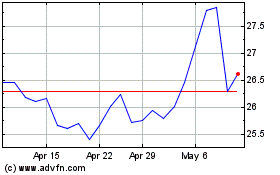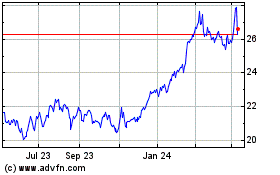China's Consumer Inflation Picks Up
18 February 2016 - 4:10PM
Dow Jones News
BEIJING—Consumer inflation in China edged up in January, buoyed
by rising food prices ahead of the Lunar New Year holiday, though
economists said the uptick is likely to be short-lived as excess
capacity weighs on the economy.
China's consumer-price index rose 1.8% in January from a year
earlier, the government's statistics bureau reported Thursday. The
rate is higher than December's 1.6% rise and matched the median
forecast by 13 economists in a survey by The Wall Street
Journal.
Despite the rise, price pressure remains weak and deflation is
still a risk for the world's second-largest economy as it struggles
to slough off a housing glut, high debt levels and factories
pumping out too many goods.
"Deflation is the main risk rather than inflation," said ANZ
Research economist Li-Gang Liu. "Domestic demand is quite weak.
They need to deal with overcapacity," he said.
Prices at the factory gate remain deep in deflationary territory
and have been so for nearly four years. The producer-price index
declined 5.3% in January from a year earlier, slightly better than
expected. This compared with a 5.9% year-over-year drop in
December.
The rise in January's consumer inflation came from double-digit
price increases for pork, China's staple meat and a fixture in
dishes served over the Lunar New Year holiday, which ends this
month. Prices for vegetables and fruits rose too due to colder
weather, statistics bureau economist Yu Qiumei said in a
report.
Zhou Jinhong, a 40-something accountant working in Beijing, said
she has seen pork, beef and egg prices increase, prompting her to
consider changing her eating habits and shop more carefully.
"If pork gets too expensive, I'll consider buying less," she
said, emerging from a Beijing Hualian supermarket in the
northwestern part of the capital. "But supermarket sales can
compensate for higher prices in other goods. That can make the
increases less obvious."
Lower prices tend to help an economy if consumers and companies
use the savings to buy and invest elsewhere. A protracted downward
price pressure can cause them to delay spending in the belief that
waiting will result in still lower costs in the near future,
dragging down growth. It can also make debt repayment more
difficult.
Consumer prices in China rose 1.4% in 2015, well below the
government's goal of keeping them under 3%, the smallest increase
since 2009.
China continues to battle deflation at the factory gate as the
price of oil and other commodities weakens further. Chinese steel
prices in the 2015 fourth quarter were 60% to 70% below peak
second-quarter 2008 levels, on average, the Australian government
and Westpac Bank said in a report this month.
Weak consumer inflation gives policy makers more leeway to
loosen monetary and fiscal policy further. Economists said they
expect Beijing to continue to cut interest rates and reduce the
portion of reserves that banks are required to maintain.
"The economy still faces huge downward pressure," said Nomura
Group economist Zhao Yang. "Monetary policy will likely remain
supportive."
Mr. Zhao said he expects the central bank to make four cuts in
required bank reserves and two broad interest-rate cuts in 2016.
ANZ Research's Mr. Liu said the next cut in bank reserves could
come this quarter to be followed by one or more broad interest-rate
cuts later this year.
Low inflation or outright deflation is also weighing on tax
receipts, said rating company Moody's Investors Service in a
report, as fiscal revenue last year grew by 8.4%, its smallest rise
in over two decades.
Liyan Qi and Grace Zhu contributed to this article.
Write to Mark Magnier at mark.magnier@wsj.com
(END) Dow Jones Newswires
February 17, 2016 23:55 ET (04:55 GMT)
Copyright (c) 2016 Dow Jones & Company, Inc.
Westpac Banking (ASX:WBC)
Historical Stock Chart
From Oct 2024 to Nov 2024

Westpac Banking (ASX:WBC)
Historical Stock Chart
From Nov 2023 to Nov 2024
